

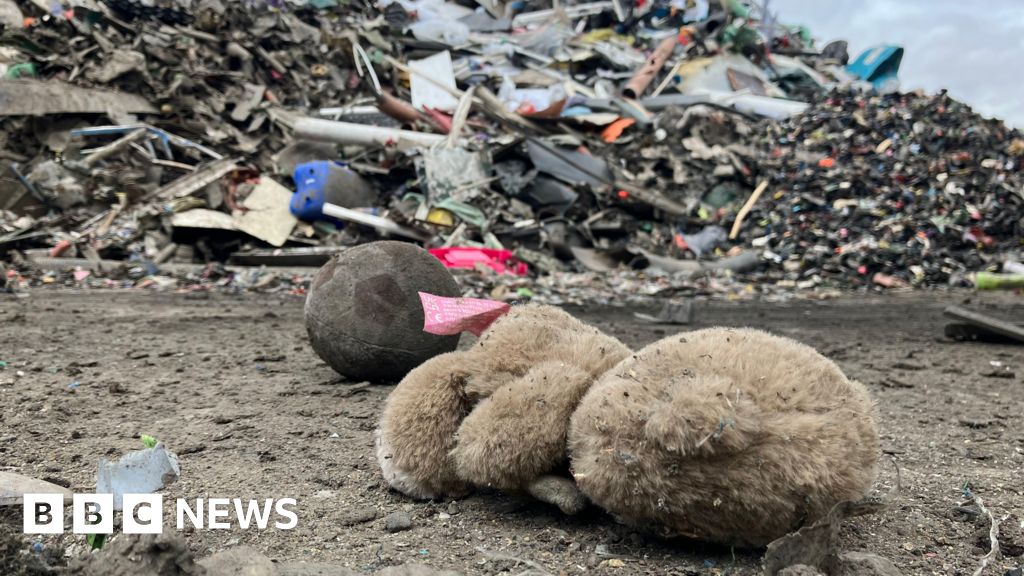
Gareth Bryer,Steffan Messenger
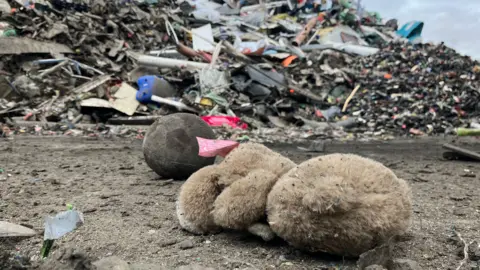 BBC
BBCWales has been named the second best country in the world for recycling and is within touching distance of the top spot, new analysis shows.
Wales is listed just behind Austria in the global rankings, with both countries managing to recycle 59% of their waste.
Northern Ireland is ranked ninth, England 11th and Scotland 15th among the 48 countries included in the comparison.
First Minister Vaughan Gething said the “fantastic news” was thanks to the efforts of “householders and workplaces across Wales”.
Wales has put a particular focus on improving recycling rates in recent decades – with statutory targets for local councils and all homes asked to separate out their food waste among a number of initiatives.
Some councils have moved to only picking up general waste at the kerbside once a month, with Denbighshire being the latest – introducing four weekly collections for black bags in June.
In Denbigh, Catrin Juckes-Hughes, 32, said she had tried to make recycling part of her family’s “everyday routine”.
“If people are recycling properly you don’t notice the difference (with the bin collections),” she said.
“The general waste you have is actually just a small amount.”
But Wendy Davies, 78 said the situation was a struggle for older people.
“How can they cope having to split everything in their kitchen?” she said.
“If you live in a flat like I do it’s a complete mess trying to keep everything to put in the bins outside”.
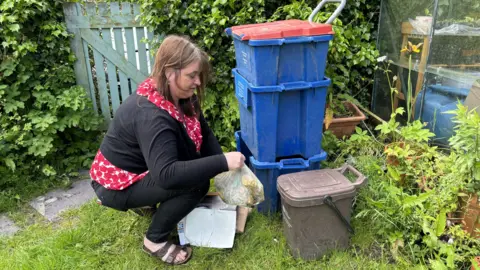
The Welsh government puts the average recycling rate in Wales at 66% – this is based on municipal waste collected by local authorities from households and some businesses.
It varies from 59% in Torfaen to 72% in Pembrokeshire and Swansea.
To compile a global league table, researchers used a country’s reported recycling rate and other waste data to try and rank different nations’ efforts on a like-for-like basis.
The report, by Eunomia Research and Consulting and Reloop, examined the performance of 48 countries, including the world’s largest economies.
Environmental consultant Rebecca Colley-Jones, said Wales had been on a “journey” with recycling, ever since control over waste management was devolved to what is now the Welsh Parliament.
“If you look at 1997 (the rate) was around 9% – now some councils have reached 70%,” she said.
She believes that a series of strategies, with accompanying targets and funding, is responsible for the success.
“There’s been the funding, there’s been the will there, everybody’s been on board – local companies have adapted, to be able to provide the collection infrastructure,” she said.
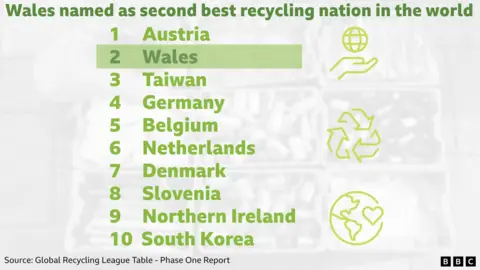
AWD Ltd in Port Talbot – run by former rugby player and coach Alun Wyn Davies – receives hard plastic waste from 18 of the 22 Welsh local authorities and sells it on to be made into new products.
The company already employs 38 people to sort through the different grades of plastic, with another 22 due to start soon.
“The only snag is that a lot of it leaves Wales – it all stays in the UK but it goes over the bridge,” Mr Davies said.
Long term he hopes to be able to start using the waste material for manufacturing himself, but said companies like his needed support to innovate.
On the latest recycling figures, Mr Davies joked that it was nice to see Wales at the top because “we’re not doing very well at the rugby at the minute are we?”.
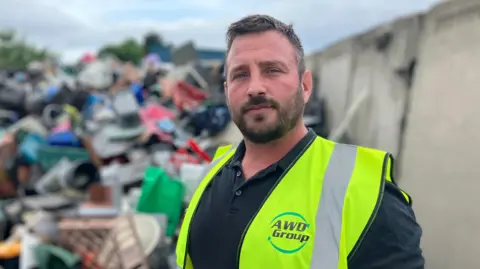
The Welsh government is aiming for Wales to be recycling, reusing or composting 70% of its waste by 2025 and be a “zero waste nation” by 2050.
Latest statistics suggest that of the 155kg of household waste each person in Wales sends to landfill annually, most of it could be recycled.
Like the rest of the UK, Wales intends to introduce the collection of soft or stretchy plastic – things like crisp packets and salad bags – from households by March 2027.
Meanwhile, a stricter recycling regime for businesses was introduced in April – forcing them to separate their waste and leading to concerns over the cost implications from some.
Climate change secretary Huw Irranca-Davies said that as well as improving the environment, recycling offered “important benefits to the economy”.
“I often talk about a Welsh way of doing things and the team effort which had led to today’s achievement is one we should all be rightly proud of – da iawn Cymru!” he said.
Plaid Cymru’s climate change spokesperson, Delyth Jewell MS, said Wales had set “an example to the rest of the UK”.
“We cannot rest on our laurels with this – and the recent push-back that there’s been to the recycling rules for businesses show how important it is that adequate support is given to make doing the right thing, the easy thing too,” she said.
“Wales must now aim for the top place in these global rankings.”
The Welsh Conservatives’ climate change spokesperson Janet Finch-Saunders MS said that while she was pleased by the news, recycling rules were “extremely confusing and chaotic”.
“Businesses with outdoor space are seeing large areas filled up with numerous different bins, and no consideration has been given to those without room for more rubbish receptacles,” she said.
“The fact that the Welsh government can celebrate this achievement when they are led by a First Minister who has taken political donations from a man convicted of environmental offences would be laughable if it wasn’t such a disgrace,” she added.
Additional reporting by Meleri Grug Williams and Brendon Williams.